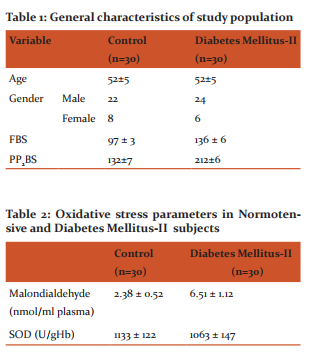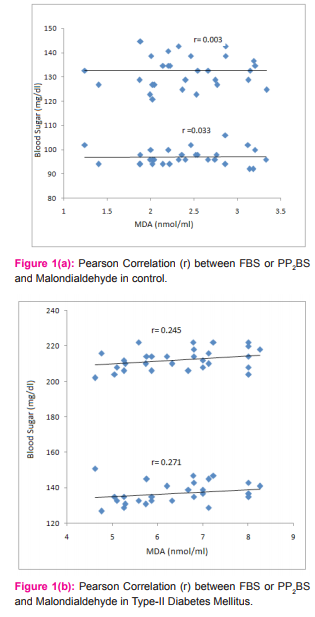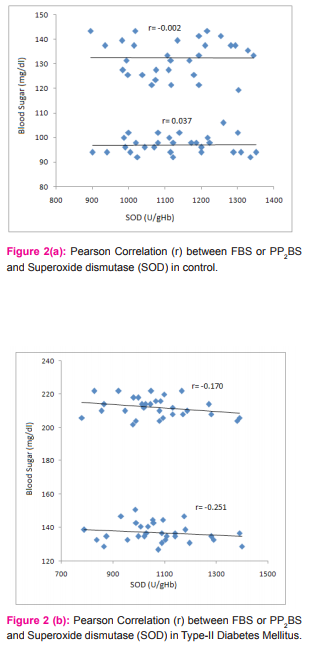IJCRR - 8(13), July, 2016
Pages: 31-34
Date of Publication: 12-Jul-2016
Print Article
Download XML Download PDF
STUDY OF OXIDATIVE STRESS PARAMETERS IN TYPE-II DIABETES MELLITUS AND THEIR CORRELATION WITH BLOOD GLUCOSE LEVEL
Author: Prakash P. Malam1, Anand J. Amin2, Ashish C. Zala, Vipul M. Navadiya, Dhruv Patel, Dharna A. Patel
Category: Healthcare
Abstract:Objective: Increasing evidence has underlined the importance of oxidative stress in the pathophysiology of type-II diabetes mellitus and its contribution to the associated complications. However the correlation between oxidative stress parameters and blood glucose levels is not clearly understood.
Method: Present study was done to evaluate the oxidative stress parameters in patients with type-II diabetes mellitus and to check the correlation, if any, between these parameters and blood glucose. Plasma malondialdehyde and superoxide dismutase levels were measured in thirty type-II diabetes mellitus and thirty normotensive subjects. Fasting and post-prandial blood glucose correlation was analyzed by Pearson's correlation.
Result: Enhanced oxidative stress was observed in type-II diabetes mellitus subjects as denoted by raised plasma malondialdehyde levels and reduced superoxide dismutase levels.
Conclusion: Plasma malondialdehyde correlated positively whereas superoxide dismutase showed negative correlation with blood glucose in type-II diabetes mellitus subjects. No significant correlation was observed between these parameters and blood glucose levels in normotensive controls.
Keywords: Oxidative stress, Type-II diabetes mellitus, Correlation, Malondialdehyde, Superoxide dismutase
Full Text:
INTRODUCTION
Type 2 diabetes is caused by a combination of genetic and environmental factors. There are two main pathological defects in the disease, insulin resistance(a decreased ability of the peripheral tissues to respond to insulin) and b-cell dysfunction(an inability of the pancreas to provide sufficient insulin to compensate for insulin resistance)(1).Oxidative stress is currently suggested as a mechanism underlying diabetes and diabetic complications (2).Enhanced oxidative stress and changes in antioxidant capacity, observed in both clinical and experimental diabetes mellitus, are thought to be the etiology of chronic diabetic complications (3). Oxidative stress is defined as a state of imbalance between oxidants and antioxidants in favour of the oxidants, potentially leading to cellular damage(4).Oxidative stress in the pathogenesis of diabetes is suggested, not only by oxygen free-radical generation,but also due to nonenzymatic protein glycosylation,alteration in antioxidant enzymes(5),In addition to GSH, there are other defense mechanisms against free radicals like the enzymes superoxide dismutase (SOD), glutathione peroxidase (GPx) and catalase (CAT) whose activities contribute to eliminate superoxide, hydrogen peroxide and hydroxyl radicals (6). Some study suggest that glipizide, metformin and rosiglitazone reduce some oxidative stress parameters in Type-II DM patients (7).Nevertheless,the available data is not conclusive and the association between human blood glucosee and oxidative stress remains to be elucidated.So the present study was undertaken to assess malondialdehyde and SOD activities in randomly selected normotensive and type-II diabetes mellitus subjects and to study the relationship, if any, between blood glucose levels and these biomarkers of oxidative stress.
MATERIALS AND METHODS
Cross sectional design was used for this study. The study protocol was approved by Institutional Ethics Committee.
Subjects
The study included thirty newly diagnosed type-II diabetes mellitus patients never treated previously for type-II diabetes mellitus.All patients were between the ages of 45 to 65 years. Thirty normotensive healthy volunteers served as controls. After explaining the study details, informed consent was obtained from all the participants.Patients with cerebrovascular or coronary artery disease, congestive heart failure, hypertensive, renal or liver disease and any active viral or bacterial infection were excluded from the study. Smokers, alcoholics and subjects taking any medication known to affect oxidative stress were also excluded.
Samples
After enrollment, 5 ml venous blood sample was collected in Na-EDTA (1 mg/ml) tubes from each subject and entrifuged immediately at 3000 rpm for 15 minutes. The separated plasma was used for estimation of MDA. Cells were washed with normal saline three times and RBCs were subjected to lysis by adding 3 ml ice cold distilled water. Hemolysate was then precipitated by adding 1 ml ethanol and 0.6 ml chloroform. The mixture was mixed thoroughly on vortex and centrifuged at 3000 rpm for 15 minutes. Supernatant was used for estimation of SOD activity.
Methods
Plasma MDA was estimated as per the method described by Ohkawa,(8) 0.5 ml plasma, 0.5 ml of normal saline, 1 ml of 20% trichloroacetic acid (TCA) and 0.25 ml TBA reagent were added in a test tube and kept in a boiling water bath at 95?C for one hour. The tube was centrifuged at 3000 rpm for 10 minutes and optical density of supernatant was measured in a spectrophotometer at 535 nm. MDA level was expressed in terms of nmol/ml of plasma. SOD activity was measured by method of Marklund and Marklund (9) with some modifications described by Nandi and Chatterjee.(10) Briefly, 50 μl hemolysate was added to 1ml of air equilibrated Tris-HCl buffer (pH 8.2) in a cuvette and allowed to incubate at room temperature. The reaction was started by adding 10 μL of freshly prepared 2.6 mM pyrogallol solution (252 mg pyrogallol and 10 μM HCl added to 100ml distilled H2O). The rate of increase in the absorbance was recorded for a period of 2 minutes, from 1 minute 30 sec to 3 minute 30 sec at 420 nm. The 50% inhibition of autooxidation of pyrogallol was measured and activity of SOD was expressed as U/gHb.
Statistical analysis
Data were expressed as mean ± SD. Student t test was used to assess statistical differences between the groups. Blood glucose and their parameters was anlyesed by pearson’s correlation . Differences were considered statistically significant at p < 0.05.
RESULTS
Thirty type-II diabetes mellitus and thirty age matched normotensive controls were included in the study. Baseline characteristics of both groups are shown in table 1. In type-II diabetes mellitus group, FBS and PP2 BS were significantly higher than the control group (p < 0.001) (Table 1). Levels of oxidative stress biomarkers in both groups are shown in Table 2. Plasma MDA was increased significantly in type-II diabetes mellitus group compared to controls (p < 0.01). The activity of SOD was significantly lower in type-II diabetes mellitus group (p < 0.01).

We further studied the relationship between these two parameters and blood glucose levels in both groups. Pearson correlation coefficients between the different parameters assessed and FBS and PP2 BS. Plasma MDA correlated positively with FBS and PP2 BS in type-II diabetes mellitus subjects (fig. 1b). SOD showed negative correlation with FBS and PP2 BS in type-II diabetes mellitus subjects (fig 2b). No correlation was observed between any of these parameters with FBS and PP2 BS in controls (fig 1a and 2a).


DISCUSSION
The present study was done to evaluate the oxidative stress parameters in the patients with type-II diabetes mellitus and to assess the relationship, if any, between these parameters and blood glucose levels. We observed that malondialdehyde levels were significantly raised in the patients of essential type-II diabetes mellitus and there was concomitant reduction of antioxidant enzymes superoxide dismutase. Increased production of free radicals together with increased lipid peroxidation and decreased antioxidant enzymes in type-II diabetes mellitus was demonstrated in previous studies.13,14 It is suggested that in type-II diabetes mellitus, activation of enzymes involved in free radical synthesis leads to overproduction of superoxide anion, hydrogen peroxide and other reactive oxygen species.(11) Due to their highly reactive nature and nonspecific binding, ROS can attack almost all biomolecules including lipid membranes. MDA is a product of long chain fatty acid peroxidation that accumulates due to increased oxidative stress. MDA further accelerates peroxidation itself by synergizing with free radicals.16 Superoxide dismutase and catalase are among the primary antioxidant defense against oxidative stress. Augmented expression of these enzymes may be expected in face of increased production of reactive oxygen species in type-II diabetes mellitus . However, the decreased level of antioxidant enzymes observed in the present study may be explained by the fact that excessive ROS inactivate these enzymes and also suppress the expression of genes encoding for these enzymes.(12) The present study showing statistically significant increase in MDA and concomitant decrease in antioxidant enzyme levels in type-II diabetes mellitus patients confirms the results of previous studies. However whether oxidative stress is the cause or the consequence of type-II diabetes mellitus is not clear and it needs further evaluation. We further examined the possible relationship between these parameters and FBS and PP2 BS levels. Positive correlation was observed between plasma malondialdehyde and blood glucose levels in typeII diabetes mellitus subjects. A negative correlation was observed between antioxidant enzyme levels and blood glucose in type-II diabetes mellitus subjects. These results suggest that the generation of free radicals increases proportionately with rise in blood glucose levels above normal. These findings point to the fact that severity of oxidative stress parallels the degree of rise in blood glucose in patients with type-II diabetes mellitus . The correlation observed in this study assumes a great importance due to the fact that oxidative stress contributes to the complications of type-II diabetes mellitus including retinopathy, neuropathy and nephropathy. Thus it seems logical that normalization of blood glucose may considerably check oxidative stress and reduce the complications of type-II diabetes mellitus.17 In view of their ability to decrease the vascular oxidative stress in addition to their blood pressure lowering effect these agents may prove beneficial in long term treatment of type-II diabetes mellitus .
CONCLUSION
Oxidative stress is increased in patients with type-II diabetes mellitus as videnced by the significant changes in the levels of oxidative stress parameters. Moreover, these parameters correlate with the blood glucose in type-II diabetes mellitus . Thus attempts to lower blood pressure could prove beneficial in such patients by reducing the oxidative stress related long terms complications. Funding: No funding sources Conflict of interest: None declared Ethical approval: The study was approved by the Institutional Ethics Committee
ACKNOWLEDGMENTS
We thank the medical record in charge and staff of hospitals for their co-operation and support during the study and also patient who participate in this study
References:
1. Hales CN. The pathogenesis of NIDDM. Diabetologia. 1994 Sep;37 Suppl 2:S162-8. PubMed PMID: 7821732. Epub 1994/09/01. eng.
2. Gutteridge JM, Halliwell B. Comments on review of Free Radicals in Biology and Medicine, second edition, by Barry Halliwell and John M. C. Gutteridge. Free Radic Biol Med. 1992;12(1):93-5. PubMed PMID: 1537574. Epub 1992/01/01. eng.
3. Baynes JW. Role of oxidative stress in development of complications in diabetes. Diabetes. 1991 Apr;40(4):405-12. PubMed PMID: 2010041. Epub 1991/04/01. eng.
4. Sies H. Oxidative stress: introductory remarks. Oxidative stress. 1985:1-8.
5. Strain JJ. Disturbances of micronutrient and antioxidant status in diabetes. Proc Nutr Soc. 1991 Dec;50(3):591-604. PubMed PMID: 1809968. Epub 1991/12/01. eng.
6. Soto C, Recoba R, Barron H, Alvarez C, Favari L. Silymarin increases antioxidant enzymes in alloxan-induced diabetes in rat pancreas. Comp Biochem Physiol C Toxicol Pharmacol. 2003 Nov;136(3):205-12. PubMed PMID: 14659454. Epub 2003/12/09. eng.
7. Baynes JW, Thorpe SR. Role of oxidative stress in diabetic complications: a new perspective on an old paradigm. Diabetes. 1999;48(1):1-9.
8. Ohkawa H, Ohishi N, Yagi K. Assay for lipid peroxides in animal tissues by thiobarbituric acid reaction. Anal Biochem. 1979;95(2):351-8.
9. Marklund S, Marklund G. Involvement of the superoxide anion radical in the autoxidation of pyrogallol and a convenient assay for superoxide dismutase. Eur J Biochem. 1974 Sep 16;47(3):469-74. PubMed PMID: 4215654. Epub 1974/09/16. eng.
10. Nandi A, Chatterjee I. Assay of superoxide dismutase activity in animal tissues. J Biosci. 1988;13(3):305-15.
11. Rolo AP, Palmeira CM. Diabetes and mitochondrial function: role of hyperglycemia and oxidative stress. Toxicol Appl Pharmacol. 2006 Apr 15;212(2):167-78. PubMed PMID: 16490224. Epub 2006/02/24. eng.
12. Lipinski B. Pathophysiology of oxidative stress in diabetes mellitus. J Diabetes Complications. 2001 Jul-Aug;15(4):203-10. PubMed PMID: 11457673. Epub 2001/07/18. eng.
|






 This work is licensed under a Creative Commons Attribution-NonCommercial 4.0 International License
This work is licensed under a Creative Commons Attribution-NonCommercial 4.0 International License